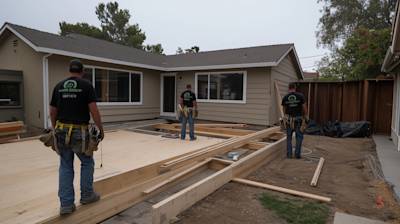When you own a home, you gradually build up a significant financial asset – your home equity. Utilizing this equity in the most efficient way can act as a key to a plethora of financial solutions like covering renovation costs, consolidating debt, or funding higher education costs. One such solution is the Home Equity Loan. This comprehensive guide will shed light on the details of home equity loans, how they work, and when they may be a fitting option.
What is a Home Equity Loan?
Home equity loans, often known as second mortgages, allow homeowners to borrow money by using their home equity as collateral. This equity is the market value difference between your property’s worth and your outstanding mortgage balance. In layman's terms, it represents the portion of the home you truly "own".
Home Equity Loan: How Does it Work
Home Equity Calculation
Before you understand how a home equity loan functions, it's essential to know how equity is calculated. The formula for this is quite simple:
Equity = Appraised home value — Outstanding mortgage balance
If the resultant equity is high, it signifies that a substantial portion of your home loan repayment has been done, and it's this equity that can be utilized to avail a home equity loan.
Borrowing Process
The borrowing process for home equity loans bears similarities to getting your original mortgage. You'll need to go through an approval process that involves:
- Income verification
- Credit score check
- Home appraisal
If you have a solid income, a good credit score, and considerable home equity, you stand a better chance of getting approved for this loan.
Factors Affecting Home Equity Loan Amount
Home's Market Value
A higher market value for your home directly translates into larger equity. Hence, your home value is one of the primary determining factors in how much you can borrow through a home equity loan.
Remaining Mortgage
Your remaining mortgage balance is subtracted from your home's market value to calculate equity. Thus, smaller outstanding mortgages lead to higher available equity and vice versa.
Lender's Loan-to-Value Ratio (LTV)
Most lenders offer loans only up to a certain Loan-to-Value ratio, typically around 85%. It directly affects the maximum loan amount.
Maximum loan amount = (Value of home x LTV) - Remaining mortgage
If your lender's LTV limit is 85% and your home value is $400,000 with a remaining mortgage of $150,000, the maximum loan amount you can get is $190,000.
Advantage of Home Equity Loans
Home equity loans come with several advantages:
- Lower interest rates than other types of loans
- Option to borrow a large sum of money
- Tax-deductible interest (when used for home improvements)
Cautionary Notes for Home Equity Loans
While home equity loans can be beneficial, they also have potential downfalls:
- Risk of losing your home due to non-payment
- Closing costs and fees
- Potential for over-borrowing

Frequently Asked Questions about Home Equity Loan
How Do Home Equity Loans Differ from Other Types of Loans?
In comparison with other loan types, the distinguishing characteristic of home equity loans is that they use your property as collateral. This generally allows for larger loan amounts and lower interest rates because you're essentially borrowing against your own home. However, the drawback is, if for some reason you can't keep up with your repayments, you potentially risk losing your house.
How is the Amount of my Home Equity Loan Determined?
The amount of your home equity loan is typically determined by the value of your home and the remaining balance on your mortgage. Lenders will usually let you borrow up to around 85% of the appraised value of your home, less the amount you owe on your first mortgage. Your credit history, income, and market value of your home are other factors that lenders consider when determining your loan amount.
What is the Interest Rate on a Home Equity Loan?
Interest rates for home equity loans are typically lower compared to other forms of credit, as your home is used as collateral to guarantee the loan. The actual interest rate you'll be offered will depend on factors like your credit history, loan amount, and term length. Keep in mind, most home equity loans have fixed interest rates which mean your repayments may stay the same over the life of the loan.
How Long Does it Take to Get a Home Equity Loan?
Obtaining a home equity loan typically takes between 2 - 4 weeks, although it can sometimes take longer. The timeline may depend on appraisal times, your lender's processing speed, and your readiness with necessary documentation. It's paramount to remember that patience will be needed to get everything finalized.
Can I Avoid Paying Interest on a Home Equity Loan?
Unlike credit cards, where there is an interest-free grace period, interest is charged on a home equity loan from the moment you take it out, and continues until the entire loan amount is paid off. Refinancing your loan with a lower interest rate, or making additional payments can potentially reduce the amount of interest paid over the life of the loan.
What Happens if I Sell My House While Having a Home Equity Loan?
If you sell your house while having a home equity loan, the loan must be paid off from the sale proceeds before you receive any. Upon the sale of your property, priority is given to paying off the first mortgage, and then the remaining funds are used to pay off the home equity loan.
Can I Get a Home Equity Loan With Bad Credit?
Though a good credit score can provide better terms and interest rates on a home equity loan, it’s not impossible to get one with bad credit. However, you may be required to have a higher percentage of equity in the home and may face higher interest rates, and this option should be carefully considered.
Are Home Equity Loan Interests Tax Deductible?
As of the 2018 tax year, the IRS has stipulated that interest paid on home equity loans and lines of credit is only tax-deductible if the loan was used to "buy, build or substantially improve the taxpayer’s home that secures the loan," up to certain limits.

Pros of Home Equity Loans
Interest Rates are Comparatively Lower
One of the major advantages of a home equity loan is the comparably lower interest rates they offer. Typically, these types of loans have significantly lower interest rates compared to personal loans or credit cards, making them a potentially cost-effective way to borrow. This lower rate is because the loan is secured against your house, reducing risk for the lender.
Large Loan Amounts
Given that this type of loan is secured against your home, you may be able to access larger loan amounts than you could with other types of unsecured borrowing. This can be particularly useful for funding larger projects, such as home renovations, or consolidating larger amounts of debt.
Potential Tax Benefits
In some cases, depending on specifics of individual financial situations and the purpose for which the loan was taken, the interest on a home equity loan could be tax-deductible. However, tax laws are complex and vary wildly from place to place, so you should consult with a tax advisor to understand if this benefit applies to you.
Fixed Rate Payments
Home equity loans usually come with a fixed interest rate, meaning your payments will remain the same for the length of the loan. This predictability can make budgeting easier, eliminating surprises caused by fluctuating interest rates.
Cons of Home Equity Loans
Risk of Foreclosure
The most significant risk associated with a home equity loan is that your property is used as collateral. If you're unable to repay the loan, you risk foreclosure on your home. This risk puts your housing security on the line, which is a factor you should seriously consider when thinking about a home equity loan.
Fees and Closing Costs
Like primary mortgages, home equity loans often come with fees for the loan application, home appraisal, and closing costs. These costs can add up and may add an upfront cost to the loan, making it more expensive than you originally anticipated.
Potential for Over-Borrowing
Because of the ability to borrow large sums, there's a danger of borrowers taking out more than they need or can afford. Over-borrowing can lead to an endless cycle of debt, typically when borrowers continue to draw from the equity in their homes.
Fluctuating Home Values
Your home's value could decrease over time, reducing the amount of equity you have available. This could potentially leave you with a loan that’s larger than the value of your house, known as being “underwater” on your mortgage.
Impact on Credit
While a home equity loan can help improve your credit if managed responsibly, it can also damage it if things go wrong. Missed or late payments can have a negative impact on your credit score, and having too much debt can also lower your score.
Loan Repayment Period
Home equity loans usually have longer repayment periods, often between 10 to 30 years. This long commitment period might not be suitable for everyone, particularly those looking for short-term financing solutions. Moreover, spreading the loan over a long period means accruing more interest expenses.
Limited Use
Contrary to personal loans which can be used for any purpose, some lenders may restrict how you can use a home equity loan. For instance, some might not allow you to use it for business investments or student loans. Thus, the usage flexibility of such loans may be limited.

Myths and Misconceptions About Home Equity Loans
Home equity loans are a popular financial product that allow homeowners to borrow money against the equity they've accumulated in their property. However, there are many myths and misconceptions associated with these loans. This article aims to debunk some of these misconceptions to help you make an informed decision.
Myth 1: Home Equity Loans Are Only for Home Improvements
Misconception
Many people believe the only reason to get a home equity loan is to finance home improvements. While this is a common use, it's certainly not the only one.
Reality
Home equity loans can be used for a variety of purposes, not just for home improvements. You could use it for consolidating high-interest debt, paying for a child's tuition, investing in a business, or even for financing a vacation.
Myth 2: Interest Rates on Home Equity Loans Are Always Low
Misconception
There's a widespread belief that home equity loans always come with low-interest rates.
Reality
Interest rates on home equity loans can vary widely based on your credit score, loan term, and loan amount. While these loans can offer lower rates than credit cards or personal loans, the rates aren't always 'low.' It's important, therefore, to shop around and compare rates before deciding on a loan.
Myth 3: You Can Only Get a Home Equity Loan If You Have a Lot of Equity
Misconception
Many people think they need to have a huge amount of equity in their homes before they can qualify for a home equity loan.
Reality
While it's true that the more equity you have, the more you potentially can borrow, it's not true that you need a lot of equity to qualify for a loan. Many lenders offer home equity loans to borrowers with as little as 15%-20% equity in their homes.
Myth 4: Taking Out a Home Equity Loan Means You're Selling Your Home
Misconception
Some people mistakenly equate taking out a home equity loan with selling their home.
Reality
When you take out a home equity loan, you aren't selling your home. You're simply borrowing against the value that you've already paid into your home. You still own your home and are responsible for making both your original mortgage and your new equity loan payments.
Myth 5: You'll Be Able to Deduct the Interest from Your Home Equity Loan on Your Taxes
Misconception
Many homeowners believe that the interest paid on home equity loans is always tax-deductible.
Reality
While it's true that you can often deduct the interest from your home equity loan, it's not always the case. The Tax Cuts and Jobs Act of 2017 changed the rules, and now the deduction only applies if you use the loan funds to buy, build, or improve the property that the loan is secured against.
Myth 6: Home Equity Loans Are Similar to Personal Loans
Misconception
Many borrowers confuse home equity loans with personal loans, believing they operate in the same way.
Reality
Though home equity loans and personal loans both provide you with a lump sum of cash, they are different types of loans. The most significant difference is that a home equity loan is secured against your home, while a personal loan is unsecured. This means that if you can't pay back your home equity loan, you could lose your home.
Myth 7: Taking Out a Home Equity Loan is a Simple and Quick Process
Misconception
Some borrowers believe that getting a home equity loan is a straightforward and fast process.
Reality
The process of getting a home equity loan can take several weeks to a few months. It involves an appraisal of your home, lots of paperwork, and potentially lengthy underwriting processes. The time it takes can also depend on the lender you choose.
Understanding the realities behind these myths can help you make a more informed decision when considering a home equity loan. Remember, it's always a good idea to do your own research and consult with a trusted financial advisor before making any major financial decisions.
Summary
If you're trying to find a way to finance a big purchase or consolidate high-interest debt, a home equity loan could be a fine solution. It's important to remember though, this type of loan uses your house as collateral. And if you fail to repay the loan, you may lose your home. Keep in mind, a home equity loan is not a decision to make hastily.
What makes a home equity loan attractive is the possibility of getting a large availability of funds at a relatively low interest rate. However, it is essential to tread carefully and fully understand the terms and conditions before signing on the dotted line. It pays to do thorough research before making any major financial decisions.
Yet, there's no denying a home equity loan can provide quick access to capital when you need it the most. It is definitely a useful financial tool for homeowners who have built a substantial amount of equity. But remember, it’s always crucial to weigh out the benefits and possible risks to ensure it fits well within your financial plan.
About Houseidea
Houseidea is a Sacramento, CA based company that specializes in bringing terrific interior design ideas to life. Our team is incredibly passionate about creating spaces that reflect the unique stories and personalities of our clients. With over a decade long experience in the field, we know what it takes to transform your house into a dream home. Whether it’s a complete makeover or a simple update, Houseidea is dedicated to deliver results that doesn't just meet, but exceeds expectations. We believe that everyone deserves a beautiful home and it's our mission to bring that to you in a way that suits your tastes and needs.
Tags: loan, equity, finance,



















